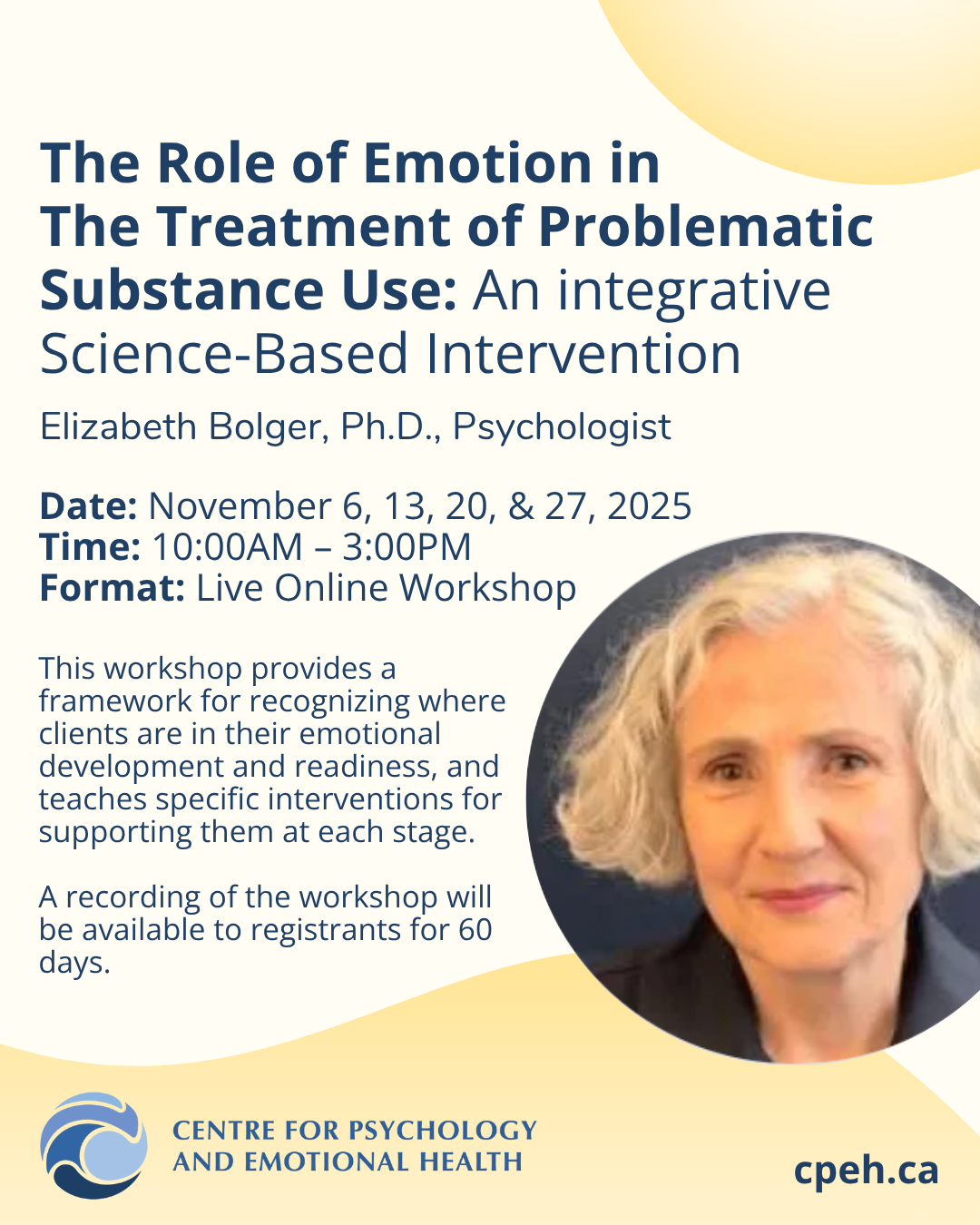The Role of Emotion in the Treatment of Problematic Substance Use: An Integrative Science-Based Intervention

Event date: -
Event location: Online
Event Link: https://www.cpeh.ca/emotion-substance-use-treatment
Event type: Multi-day (+2 days)
Workshop Overview
How often do your clients struggle with substance use, whether it is occasional overuse, emotional reliance, or long-standing addiction patterns? You might not even identify clients as having a “substance use issue” initially, but it frequently emerges as therapy progresses and often masks deeper emotional struggles. When substance use surfaces, especially outside of a clear addiction framework, therapists can feel unprepared. Even experienced clinicians may find themselves discouraged by the chronic, cyclical nature of substance use, recovery, and relapse.
At the core of many substance use struggles is a pattern of difficulty recognizing, tolerating, or expressing emotion. This includes not just painful feelings, but the full range of emotional experience. For most clients, these capacities were never fully developed. Substance use often becomes a way to regulate internal states or to escape emotional disorganization. In many cases, clinicians must begin by helping clients build fundamental skills in emotional awareness and regulation. As these capacities strengthen, therapy can shift toward accessing and transforming emotional pain through deeper therapeutic processes.
This workshop provides a framework for recognizing where clients are in their emotional development and readiness, and teaches specific interventions for supporting them at each stage. You will learn how to help clients build emotional capacity, access and process emotional pain, and support long-term emotional and behavioral change. The model is relevant to clinicians in both general mental health and addiction-specific settings.
Drawing on Emotion Focused Therapy (EFT), Cognitive Behavioural Therapy (CBT), Motivational Interviewing (MI), Dialectical Behavior Therapy (DBT), and 12-step-informed strategies, the workshop offers an integrative, practical approach to addressing substance use. Skills can be immediately applied and tailored across therapeutic modalities and client populations.
Over four weekly sessions, Dr. Elizabeth Bolger will teach a treatment model grounded in clinical research and more than three decades of practice. Whether you work in individual, couples, family, trauma recovery, or general mental health care, this workshop will offer tools that can be integrated across therapeutic modalities and tailored to clients at different stages of readiness.
Objectives
- Integrate and implement principles and interventions from Emotion Focused Therapy, Cognitive Behavioural Therapy, Dialectical Behavioural Therapy, Motivational Interviewing, and 12-steps approaches to help clients facing addiction issues
- Implement interventions and strategies to help clients develop emotional processing skills critical to relapse prevention; process previous painful experiences at the root of the problem; manage current emotional experiences in ways that are adaptive and healthy.
Details
Date: November 6, 13, 20, & 27, 2025
Time: 10:00AM – 3:00PM (Eastern Standard Time)
Format: Live Online Workshop
CE Credits
Canadian Counselling and Psychotherapy Association (CCPA)
- Approved for 16 CEC
Ontario Association of Mental Health Professionals (OAMP)
- Approved for 16 CEC
**Participation in this workshop allows OAMHP members to apply 16 CECs towards their required continuing education hours. OAMHP’s review of the general content of this workshop recognizes the learning objectives meet and support the criteria (1) for best known practice in continuing education and (2) for educational requirements for mental health professionals
Registration Rates
Early Bird Rate: $415 (+applicable taxes)
Regular Rate: $489 (+applicable taxes)
Student Rate: $295 (+applicable taxes)
- Students are eligible for a student rate. Please sign up here to access student benefits.
- Student rates apply to individuals currently enrolled in an undergraduate, master's, or doctoral program at a recognized post-secondary institution